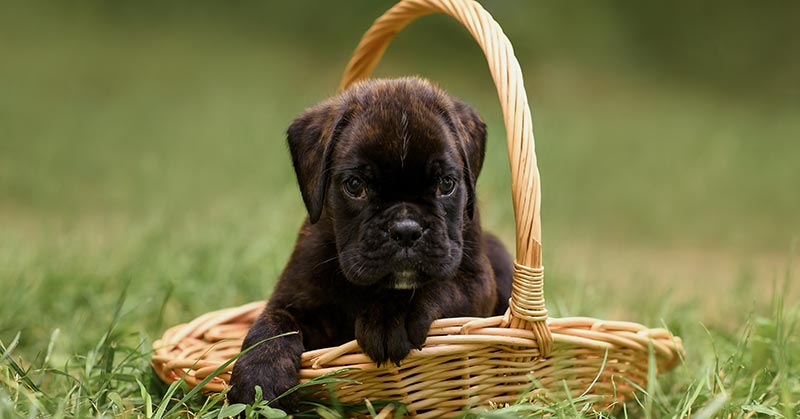Boxer puppies are an enchanting blend of boundless energy, playful antics, and heart-melting expressions. Anyone who has ever been fortunate enough to share their home with one knows that life is never dull with a Boxer pup in the mix.
In this blog post, we’ll dive deep into the wonderful world of Boxer puppies, from their characteristics and care needs to training tips.
Origin and History
The Boxer’s lineage can be traced back to a line of ancient war dogs of the Assyrian Empire. However, the modern Boxer that we know and love today was developed in Germany in the late 19th century. Bred to be a hunting dog, Boxers were used to chase down and hold large game like boar, bison, and deer until hunters could arrive.
Physical Appearance
Boxer puppies grow into medium to large-sized dogs, with males weighing between 65-80 lbs and females between 50-65 lbs. They have a distinctive square head, short hair, and a muscular build, showcasing their strength and agility.
Their coat colors vary from fawn, brindle, to white. Boxer puppies, with their dark, soulful eyes and floppy ears, can melt even the coldest of hearts.
Temperament
- Energetic: Boxer puppies are known for their boundless energy. They love to play, run, and jump, making them great companions for families with kids.
- Loyal: Loyalty is in a Boxer’s DNA. They’re protective of their family and can be wary of strangers, making them excellent watchdogs.
- Intelligent: Boxers are quick learners. With consistent training, they can pick up commands and tricks swiftly.
- Affectionate: Despite their imposing physique, Boxers are true lap dogs. They love to cuddle and be close to their human companions.
Training and Socialization
Boxer puppies are eager to please but can be headstrong. Start training early and be consistent. Positive reinforcement methods work best. Boxers can be a bit boisterous, so it’s crucial to teach them manners while they’re young.
Socialization is vital. Expose your Boxer puppy to various environments, people, and other animals to ensure they grow up to be well-rounded dogs. This will help reduce any aggressive tendencies and make them more adaptable to different situations.
Diet and Health
Boxer puppies have specific dietary needs to support their rapid growth. Invest in high-quality puppy food that provides balanced nutrition. Boxers are prone to certain health issues like hip dysplasia, heart conditions, and certain allergies.
Regular vet check-ups and a good diet can help mitigate some of these concerns.
Exercise Needs
To say a Boxer puppy is energetic would be an understatement. They require regular exercise to keep them happy and healthy. This means daily walks and play sessions. A bored Boxer can become destructive, so it’s essential to channel their energy positively.
The Boxer Puppies Barking Guide is a must-read article
Final Thoughts
Boxer puppies are a delightful addition to any household, brimming with love, loyalty, and liveliness. Their playful nature combined with their protective instincts makes them perfect for families.
Like all dogs, they require time, patience, and understanding, but the joy and companionship they bring into a home are truly unparalleled.
If you’re considering bringing a Boxer puppy into your life, prepare for an adventure filled with laughter, love, and a few chewed-up shoes!
FAQs on Boxer Puppies
Q: At what age is a Boxer considered fully grown?
A: While Boxers can continue to fill out until they are 2 or 3 years old, most are considered physically mature by 18 months.
Q: How often should I feed my Boxer puppy?
A: In the first few months, it’s recommended to feed your Boxer puppy 3-4 times a day. As they grow, you can reduce it to 2 meals a day by adulthood.
Q: Are Boxer puppies easy to train?
A: Boxers are intelligent and eager to please, which makes them trainable. However, they can be stubborn. Consistency, patience, and positive reinforcement are key.
Q: How long do Boxers typically live?
A: The average lifespan of a Boxer is 10-12 years, though some can live longer with proper care and a healthy lifestyle.
Q: Do Boxers shed a lot?
A: Boxers have a short coat and are not heavy shedders. Regular brushing can help manage and reduce the minimal shedding.
Q: Are Boxers good with kids and other pets?
A: Yes, Boxers are known for being affectionate and protective of children. They generally get along well with other pets, especially if introduced and socialized at a young age.
Q: What health issues are common in Boxers?
A: Boxers are prone to certain health problems, including hip dysplasia, heart conditions, certain cancers, and allergies. Regular vet visits and screenings can help detect and manage these issues.
Q: How much exercise does a Boxer puppy need?
A: Boxer puppies are energetic and require regular daily exercise. This includes walks, play sessions, and mental stimulation to keep them happy and healthy.



